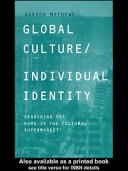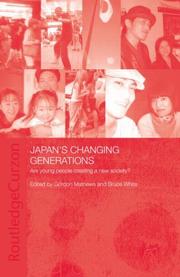| Listing 1 - 10 of 17 | << page >> |
Sort by
|

ISBN: 0520201337 0520201329 9780520201330 Year: 1996 Publisher: Berkeley : University of California Press,
Abstract | Keywords | Export | Availability | Bookmark
 Loading...
Loading...Choose an application
- Reference Manager
- EndNote
- RefWorks (Direct export to RefWorks)
Social values --- Quality of life --- Conduct of life. --- Valeurs sociales --- Qualite de la vie --- Morale pratique --- Qualité de la vie --- Social values - Japan. --- Quality of life - Japan. --- Social values - United States. --- Quality of life - United States.

ISBN: 0203459342 1134625421 1280317493 9780203459348 9780415206150 0415206154 9780415206167 0415206162 9786610317493 6610317496 9781134625420 9781280317491 9781134625376 9781134625413 1134625413 Year: 2000 Publisher: London New York Routledge
Abstract | Keywords | Export | Availability | Bookmark
 Loading...
Loading...Choose an application
- Reference Manager
- EndNote
- RefWorks (Direct export to RefWorks)
Gordon Mathews opens up the complex and debated topics of globalisation, culture and identity in a clear and lively style. His book will be an illuminating and valuable read to social and cultural anthropologists and students.
Acculturation. --- Culture. --- Ethnicity. --- Group identity. --- International relations and culture. --- National characteristics. --- Characteristics, National --- Identity, National --- Images, National --- National identity --- National images --- National psychology --- Psychology, National --- Anthropology --- Nationalism --- Social psychology --- Collective memory --- Ethnopsychology --- Exceptionalism --- Culture and international relations --- Culture --- Collective identity --- Community identity --- Cultural identity --- Social identity --- Identity (Psychology) --- Ethnic identity --- Group identity --- Cultural fusion --- Multiculturalism --- Cultural pluralism --- Cultural sociology --- Sociology of culture --- Civilization --- Popular culture --- Culture contact --- Development education --- Ethnology --- Assimilation (Sociology) --- Social aspects --- Acculturation --- Ethnicity --- International relations and culture --- National characteristics --- Culture contact (Acculturation)

ISBN: 0520916476 0585285098 9780520916470 9780585285092 0520201337 0520201329 Year: 1996 Publisher: [Place of publication not identified] University of California Press
Abstract | Keywords | Export | Availability | Bookmark
 Loading...
Loading...Choose an application
- Reference Manager
- EndNote
- RefWorks (Direct export to RefWorks)
Here is an original and provocative anthropological approach to the fundamental philosophical question of what makes life worth living. Gordon Mathews considers this perennial issue by examining nine pairs of similarly situated individuals in the United States and Japan. In the course of exploring how people from these two cultures find meaning in their daily lives, he illuminates a vast and intriguing range of ideas about work and love, religion, creativity, and self-realization.Mathews explores these topics by means of the Japanese term ikigai, "that which most makes one's life seem worth living." American English has no equivalent, but ikigai applies not only to Japanese lives but to American lives as well. Ikigai is what, day after day and year after year, each of us most essentially lives for.Through the life stories of those he interviews, Mathews analyzes the ways Japanese and American lives have been affected by social roles and cultural vocabularies. As we approach the end of the century, the author's investigation into how the inhabitants of the world's two largest economic superpowers make sense of their lives brings a vital new understanding to our skeptical age.
Social values --- Quality of life --- Conduct of life --- Social Conditions --- Sociology & Social History --- Social Sciences --- Ethics, Practical --- Morals --- Personal conduct --- Ethics --- Philosophical counseling --- Conduct of life.
Book
ISBN: 9781845457082 9781845454487 1845454480 Year: 2009 Publisher: New York Berghahn Books
Abstract | Keywords | Export | Availability | Bookmark
 Loading...
Loading...Choose an application
- Reference Manager
- EndNote
- RefWorks (Direct export to RefWorks)
Quality of life --- #SBIB:39A5 --- 316.613.4 --- Well-being --- Happiness --- Anthropology --- Gladness --- Emotions --- Cheerfulness --- Contentment --- Pleasure --- Welfare (Personal well-being) --- Wellbeing --- Health --- Wealth --- Life, Quality of --- Economic history --- Human ecology --- Life --- Social history --- Basic needs --- Human comfort --- Social accounting --- Work-life balance --- Kunst, habitat, materiële cultuur en ontspanning --- Sociale gevoelens. Emoties --- Philosophy. --- Philosophy --- 316.613.4 Sociale gevoelens. Emoties

ISBN: 0415322278 0415384915 Year: 2005 Publisher: London RoutledgeCurzon
Abstract | Keywords | Export | Availability | Bookmark
 Loading...
Loading...Choose an application
- Reference Manager
- EndNote
- RefWorks (Direct export to RefWorks)
This book argues that "the generation gap" in Japan is something more than young people resisting the adult social order before entertaining and comforming to that order. Rather, it signifies something more fundamental: the emergence of a new Japan, which may be quite different from the Japan of postwar decades. It argues that while young people in Japan in their teens, twenties and early thirties, are not engaged in overt social or political resistance, they are turning against the existing Japanese social order, whose legitimacy has been undermined by the past decade of economic downturn. The book shows how young people in Japan are thinking about their bodies and identities, their social relationships, and their employment and parenting, in a new and generationally contextual ways, that may help to create a future Japan quite different from Japan of the recent past.
Youth --- Young adults --- Conflict of generations --- Jeunesse --- Jeunes adultes --- Conflit de générations --- Japan --- Japon --- Social conditions --- Conditions sociales --- J4000.90 --- J4204.30 --- J4224 --- Young people --- Young persons --- Adulthood --- Gap, Generation --- Generation gap --- Generational conflict --- Intergenerational conflict --- Generations --- Intergenerational relations --- Social conflict --- Japan: Social history, history of civilization -- postwar Shōwa (1945- ), Heisei period (1989- ), contemporary --- Japan: Sociology and anthropology -- communities -- age groups -- youth, minors --- Japan: Sociology and anthropology -- social policy and pathology -- youth, young men and women
Book
ISBN: 1282627406 9786612627408 184545877X Year: 2009 Publisher: New York : Berghahn Books,
Abstract | Keywords | Export | Availability | Bookmark
 Loading...
Loading...Choose an application
- Reference Manager
- EndNote
- RefWorks (Direct export to RefWorks)
Anthropology has long shied away from examining how human beings may lead happy and fulfilling lives. This book, however, shows that the ethnographic examination of well-being-defined as "the optimal state for an individual, a community, and a society"-and the comparison of well-being within and across societies is a new and important area for anthropological inquiry. Distinctly different in different places, but also reflecting our common humanity, well-being is intimately linked to the idea of happiness and its pursuits. Noted anthropological researchers have come together in this volume to
Quality of life --- Well-being --- Happiness --- Anthropology --- Philosophy.

ISBN: 128270589X 9786612705892 9882200877 9789882200876 9781282705890 9622095461 9789622095465 9622095364 9789622095366 Year: 2001 Publisher: Hong Kong Hong Kong University Press
Abstract | Keywords | Export | Availability | Bookmark
 Loading...
Loading...Choose an application
- Reference Manager
- EndNote
- RefWorks (Direct export to RefWorks)
This book shows how the detailed ehtnographic study of consumption in Hong Kong can lead to a deeper understanding of Hong Kong life as a whole, as well as of consumption in the world at large.
Consumption (Economics) --- Consumer behavior --- Hong Kong (China) --- Economic conditions. --- Demand (Economic theory)
Book
ISBN: 9780226506074 9780226506104 9780226506241 Year: 2017 Publisher: Chicago The University Of Chicago Press
Abstract | Keywords | Export | Availability | Bookmark
 Loading...
Loading...Choose an application
- Reference Manager
- EndNote
- RefWorks (Direct export to RefWorks)
"Only decades ago, the population of Guangzhou was almost wholly Chinese. Today, it is a truly global city, a place where people from around the world go to make new lives, find themselves, or further their careers. A large number of these migrants are small-scale traders from Africa who deal in Chinese goods--often knockoffs or copies of high-end branded items--to send back to their home countries. In The World in Guangzhou, Gordon Mathews explores the question of how the city became a center of "low-end globalization" and shows what we can learn from that experience about similar transformations elsewhere in the world. Through detailed ethnographic portraits, Mathews reveals a world of globalization based on informality, reputation, and trust rather than on formal contracts. How, he asks, can such informal relationships emerge between two groups--Chinese and sub-Saharan Africans--that don't share a common language, culture, or religion? And what happens when Africans move beyond their status as temporary residents and begin to put down roots and establish families?" -- Publisher's description
Africans --- Business enterprises --- S02/0300 --- S03/0635 --- S09/0800 --- S10/0688 --- Business organizations --- Businesses --- Companies --- Enterprises --- Firms --- Organizations, Business --- China: General works--Chinese culture and the World and vice-versa --- China: Geography, description and travel--Guangzhou (incl. Foreign Settlements) --- China: Foreign relations and world politics--China and Africa --- China: Economics, industry and commerce--Africa-China economic relations --- Guangzhou (China) --- Yang-chʻeng (Guangdong Sheng, China) --- Kanton (China) --- Wu-yang chʻeng (China) --- Hui-chʻeng (China) --- Kuang-chou (Guangdong Sheng, China) --- Kwangchow (China) --- Canton (China) --- Kwangju (China) --- Guang zhou (China) --- Kouang-chou (China) --- Quảng Châu (China) --- Shengcheng (China) --- Puyün (China) --- Pʼan-yü (Guangzgou Shi, China) --- Kwang-chowfu (China) --- Fan-yü (China) --- Kuang-chou-shih (China) --- Guangzhoushi (China) --- Ethnic relations. --- Business --- Ethnology --- #SBIB:39A6 --- #SBIB:39A75 --- Etniciteit / Migratiebeleid en -problemen --- Etnografie: Azië --- 广州 (China)

ISBN: 1134091885 1280954868 9786610954865 0203946510 9780203946510 9781134091874 1134091877 9780415426541 0415426545 0415480132 9780415480130 9781134091836 9781134091881 1900785129 Year: 2008 Publisher: London New York Routledge
Abstract | Keywords | Export | Availability | Bookmark
 Loading...
Loading...Choose an application
- Reference Manager
- EndNote
- RefWorks (Direct export to RefWorks)
The idea of 'national identity' is an ambiguous one for Hong Kong. Returned to the national embrace of China on 1 July 1997 after 150 years as a British colony, the concept of national identity and what it means to ""belong to a nation"" is a matter of great tension and contestation in Hong Kong. Written by three academic specialists on Hong Kong cultural identity, social history, and mass media, this book explores the processes through which the people of Hong Kong are ""learning to belong to a nation"" by examining their relationship with the Chinese nation and state
Nationalism --- Consciousness, National --- Identity, National --- National consciousness --- National identity --- International relations --- Patriotism --- Political science --- Autonomy and independence movements --- Internationalism --- Political messianism --- Hong Kong (China) --- History. --- S27/0510 --- S27/0515 --- S27/0800 --- Hong Kong--History: since 1949 --- Hong Kong--China's claim to Hong Kong (incl. Sino-British Agreement of 1984) --- Hong Kong--Society in general
Book
ISBN: 9780415535083 9780415535090 Year: 2012 Publisher: Abingdon Routledge
Abstract | Keywords | Export | Availability | Bookmark
 Loading...
Loading...Choose an application
- Reference Manager
- EndNote
- RefWorks (Direct export to RefWorks)
| Listing 1 - 10 of 17 | << page >> |
Sort by
|

 Search
Search Feedback
Feedback About UniCat
About UniCat  Help
Help News
News